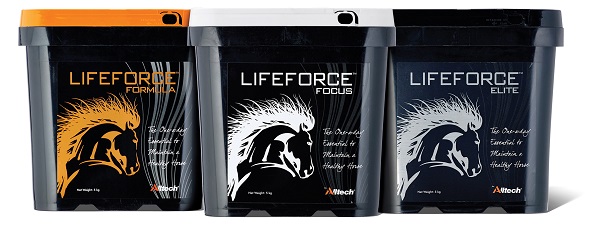Posted: 18th October 2017 | Back to news feed

Ten Things to Remember When Feeding This Winter
As we stare into the depths of winter, our horses will be spending longer periods in the stable with limited access to grazing, if any. Any grazing that is still readily available will have little or no nutritional value to most horses.
Every horse is different, so getting the balance right during winter can sometimes be a challenge to maintain condition and ensure health and wellbeing.
Here Alltech reminds us of ten things we should remember when feeding our horses this winter.

1. Start with fibre - Fibre should always be the starting point for, and basis of, any
horse’s diet, making up at least 60% of the horse’s total rations. This is true,
regardless of the lifestyle of the horse.
2. Allow access to plenty of forage - Horses have evolved to require a minimum
amount of dietary fibre as a food source for the micro-organisms located in the
caecum and large intestine, collectively called the hindgut. This also satisfies a
horse’s natural desire to chew, therefore helping to prevent boredom during long
periods when stabled.
3. Ensure your forage is of the highest quality - Purchase forage from a reputable
source to avoid the risk of mycotoxin poisoning. Mycotoxins are toxic chemicals
produced by some types of mould growth under certain environmental conditions
and occur on growing, harvested or stored cereal and forage crops. Horses are
exposed to mycotoxins through contaminated feed and forage and are highly
susceptible, as a species, to toxicity.
4. Feed according to workload and condition – If your horse is still in hard work over
winter or struggles to maintain weight, he may require extra calories. If not, cut
feed rations accordingly. Feeding a good doer unnecessary hard feed will only
lead to extra weight gain.
5. Consider an alternative fibre source for veterans - One of the biggest factors
facing veteran horses and ponies is deteriorating dentition, which has a knock-on
effect on body condition, as they find it increasingly difficult to chew long forage.
Consider an alternative such as sugar-beet pulp or high fibre cubes that can be
soaked to a mash.
6. Ensure you horse is receiving enough vitamins and minerals – Some good doers
could easily make it through winter on a diet of forage alone, however this might
not be meeting their vitamin and mineral requirements. To balance the diet, feed
a good quality vitamin and mineral supplement in a small quantity of hard feed.
7. Keep meals small and often – Horses can only digest very small amounts of
starch at any one time and, consequently, the small intestine can struggle to deal
with large concentrated meals. Receiving excess dietary starch often reduces the
ability of the hindgut to maintain a near-neutral pH, which can lead to acidic
conditions, often referred to as acidosis.
8. Introduce feed gradually – Any change to the diet must be made gradually to
reduce the risk of digestive disturbances, this includes new forage. Mix a new
batch of hay with old, introducing to the diet over a period of time.
9. Central heating for horses – The digestive system is the horse’s very own central
heating system that is fuelled by fibre. The fermentation of fibre in the hind gut
acts as a horse’s very own central heating system, keeping them warm from the
inside out. This is why feeding adequate forage during the winter months is vital.
10. Supplement the diet with yeast cultures - Yeast cultures help reduce hind gut
acidity, creating the optimum conditions for the beneficial bacteria to flourish and
therefore improve digestion as well as nutrient absorption.
The Lifeforce Range of all-natural, daily digestive aid supplements from Alltech is designed to benefit horses of every stage of life, from breeding stock to pleasure and performance animals.
For further information please visit www.lifeforcehorse.co.uk or telephone 01780 764512.
The Equestrian Index newsfeed is compiled from articles submitted by advertising members and expresses the opinions of those members. Watsons Directories Ltd shall not be held liable for any inaccuracies or mis-statements therein.
